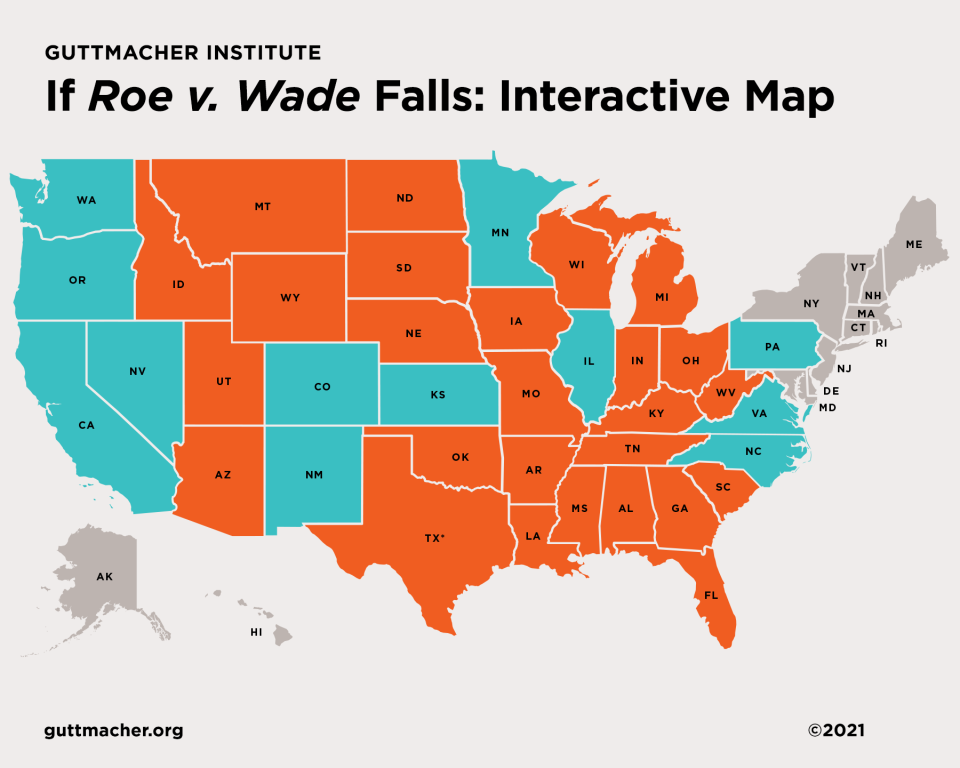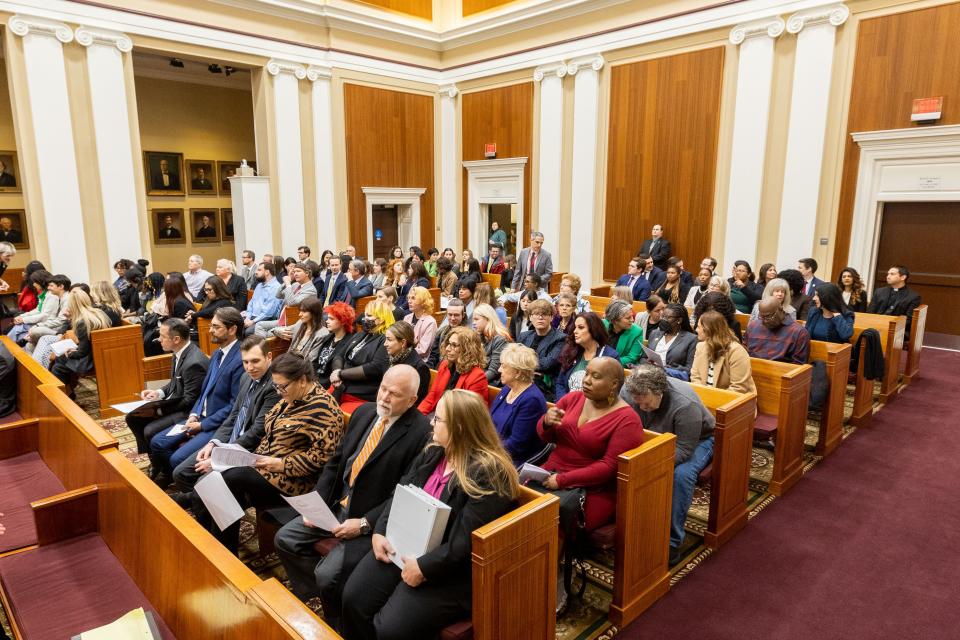Floridians head north for abortions now that six-week ban in effect
For three years, Mary has been supporting women who decide to end their pregnancies.
But on May 1, the day Florida’s 15-week abortion ban turned into a six-week ban, they stopped asking for help.
Mary, not her real name, is a North Florida-based doula, a trained professional who supports someone through birth. Her expertise also includes miscarriage and abortion. (She didn't want to use her real name for fear of harassment.)
When Florida became the only state in the Southeast without a total or near-total abortion ban, Mary would get calls from women in neighboring states who needed help with transportation or child care, or just needed a hand to hold.
It's easier to ask a stranger.
“Obviously there's still a major stigma attached to abortion, so a lot of women, whenever they do it, they do it solo,” Mary said. “They do it without really asking or reaching out for much help, which is very sad.”
Last year, abortion fund organizations were helping women who needed medication or a procedure travel into Florida.
After May 1, they’re helping get Florida women out.
Four out of the five organizations that provide monetary assistance for those seeking abortions in Florida say they have seen drastic increases in the number of callers and costs since May 1. While the average gestational age of the fetus at the time of the abortion is going down, abortion costs are going up. Because of Florida’s near-total abortion ban, more people are having to travel to Baltimore, Washington and New York for care.

“This new update from Florida only intensifies something that's already been happening,” said Jade Hurley with the DC Abortion Fund. “People have already been spending every dollar they have in order to get their abortion, spending every dollar they have just to get here, which means costs have been driven up for abortions.”
'Held together by spit and tape'
The Heartbeat Protection Act took effect May 1, a month after the state's 15-week ban took effect in April. The 15-week ban, passed in 2022, stalled in the Florida Supreme Court until this April, when the court overruled a 34-year-old decision that said a privacy provision in the state's constitution protected a woman’s right to terminate a pregnancy.
Once the 15-week-ban took effect, it triggered the six-week ban, which was passed in 2023.
Mary said the changes have made people confused and scared.
“You probably haven't been paying attention for two years because the world has been absolutely crazy, bonkers. So the fact that it's gone from 24, to 15, to six (weeks) so quickly, is just very frightening,” Mary said.
It’s easier for people to fly from Florida directly into Washington or Baltimore. The travel is more expensive, but the logistics are less complicated.

Though North Carolina is the closest state without a six-week or total abortion ban (the state allows abortion up to 12 weeks), the 72-hour in-person waiting period makes it difficult for many to make the drivable distance for an appointment.
The next closest is Virginia, where abortion is banned in the third trimester. But it's hard to find direct flights, the nearest abortion provider can be an hour from the airport, and those clinics are already at capacity.
"It's almost this game in this little (abortion fund) network that's held together by spit and tape," Hurley said. "We have to work together all the time in order to make abortion access happen."
The need for abortion 'intensifies' in Washington
Four out of the five organizations that provide abortion funds in Florida spent about $165,000 for procedures, travel and lodging for the month of May.
The Women's Emergency Network, Access Reproductive Care Southeast, the Emergency Medical Assistance Abortion Fund and the Florida Access Network all provided their May numbers to the USA TODAY Florida - Network. The Tampa Bay Abortion Fund did not respond.
Data from one of those organizations, the Women’s Emergency Network in Florida, shows a dramatic increase in money and people needing abortions.

In May 2023, the network assisted 53 Floridians to access abortion services, in and out of state, for a cost of $18,600.
By May 2024, that number jumped to 184, and the cost skyrocketed to $74,400. The cost for travel increased more than 15 times over.
Data from Access Reproductive Care Southeast shows 89% of callers from Florida in May 2024 needed to travel to get an abortion, compared with 57% of callers last year.
Florida callers also traveled an average of 592 miles to access care in May, compared with an average travel distance of 359 miles in 2023.
In Washington, “abortion is legal at all stages of pregnancy in DC and is provided when patients and physicians, together, determine it is medically appropriate,” according to the Office of the Attorney General of the District of Columbia.
Hurley, who works for an abortion fund in Washington, said that on April 1, when the Florida Supreme Court announced the Heartbeat Protection Act would take effect May 1, the need for abortions increased.
Nine people received money in April, and 21 received money in May, for a total of 30. The previous three months, from January to March, the fund assisted 22 Floridians in total.
Also during this time, the average gestational age of the fetus was 19 weeks. In May, gestational age dropped to 17 weeks.
“We don't have a practical support infrastructure to support everybody coming to the D.C. area. That was the case three months ago, that was the case six months ago, and it only intensifies,” Hurley said.
The demand for abortion access from Florida, including appointments and money for travel and procedures, is exhausting the resources from minute to minute, even though there are 12 abortion clinics in Washington.
“We’re just at the beginning of a change in the landscape that's probably going to lead to D.C., the D.C. region, and I want to expand it to even the DMV (Washington, Maryland and Virginia) being underwater,” she said.
'It's diabolical,' one abortion advocate says
Jessica Hatem is executive director of the Emergency Medical Assistance Abortion Fund, which serves people in Palm Beach County and the Treasure Coast.
She said people are confused and don’t know how the six weeks is calculated, even after the Heartbeat Protection Act has taken effect.
The law uses the term “gestational age,” which means the time measured from the mother’s first day of her last period.
As of May 1, 14 states have banned abortion outright and seven states have an abortion ban based on gestational age, of which Florida, Georgia and South Carolina ban abortion at six weeks.
“We have seen in this month of this, some people actually be able to catch that they are less than six weeks pregnant, but that's very few,” Hatem said. “Most people are still needing to leave the state for abortion care.”
Since May 1, the organization has shifted from supporting other Southerners coming to Florida for abortions to pretty much exclusively supporting Floridians leaving the state.
But she’s still keeping an eye on what's going on in those other Southern states, like Texas and Louisiana. She believes Florida could be next.
From USA TODAY: Supreme Court preserves access to widely used abortion medication mifepristone
A new law in Louisiana labels the two abortion medications, mifepristone and misoprostol, as Schedule IV substances. That means they’re in the same category as anti-anxiety medications like Xanax and Valium.
The law makes it a crime to possess them without a prescription or outside professional medical practice, punishable by one to five years in prison and fines of up to $5,000.
And in Texas, the Supreme Court upheld the state’s total abortion ban at the end of May. The law has an exception for women facing "life-threatening conditions,” but physicians who break the law can face severe penalties, including first-degree felony charges, punishable with up to life in prison, and fines of more than $100,000.
“The anti-choice movement keeps moving the goalposts. Looking at what has happened in Texas is a good indicator for what is to come, for the rest of us,” Hatem said. “We're in the process of losing more as time goes on. I by no means believe that this is where we're landing. This is what's happening now. And it's diabolical."
Ana Goñi-Lessan, state watchdog reporter for the USA TODAY Network – Florida, can be reached at agonilessan@gannett.com.
This article originally appeared on Tallahassee Democrat: Floridians head north for abortions now that six-week ban in effect


